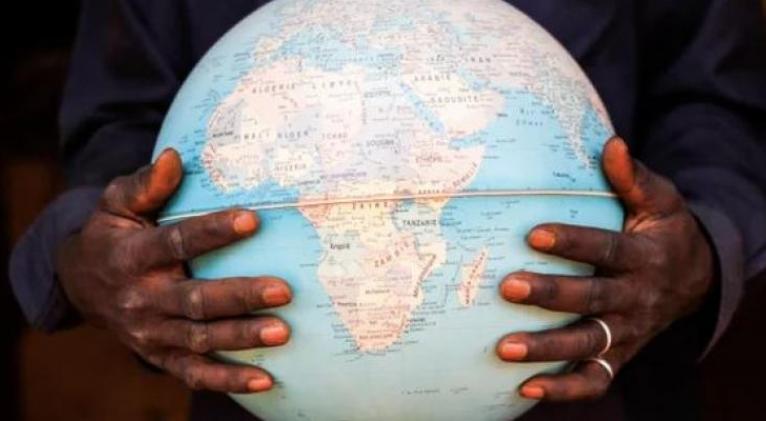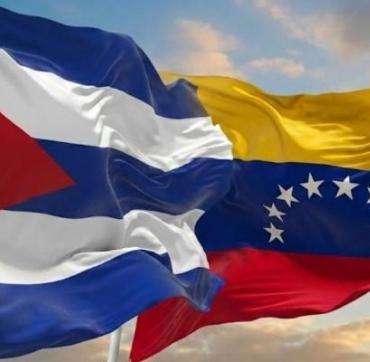Against China and Russia: Imperial Hoax in Africa
especiales

Joe Biden wants to change the face of the United States in Africa with the continued and recent dispatch of its main figures, led by Vice President Kamala Harris and Secretary of State Anthony Blinken, to talk with the continent's leaders and, while trying to reactivate ties that were never friendly, due to imperial arrogance. These visits seek to eliminate or at least lessen the growing influence of China and Russia in the region.
They ignore that these nations are at the top of African preferences, due to their honest behavior, establishing advantageous relations for both parties and taking those ties to the generosity necessary to assist one of the poorest regions in the world, despite its infinite natural wealth.
China is a benchmark of how economic relations should be, while the influence of Russia grows. Russia was approached by governments of the region to help them fight terrorism, besides condoning the African debt of more than 20,000 million dollars.
One of the most significant changes in the African political economy over the last two decades is undoubtedly the intensification of the Chinese presence on the continent. This circumstance is expressed at different levels: trade, investment, credit, technology transfer, and also migration.
This escalation is directly related to China's spectacular economic growth, which increases its presence in global markets, as well as the positioning of public policies that allow many African governments to diversify their alliances at the international level.
Naturally, these changes are not without pressure. The intensity of the mutation is such that traditional economic partners of the African countries, Europe and the U.S., try to make believe that Beijing is setting imperialist patterns, offering loans and infrastructure in exchange for oil, minerals and agricultural land with the purpose of sustaining the growth of the Asian giant.
As an extension of this approach, it’s even stated that China's financial injections into African countries respond to a logic of trapping them in a spiral of debt to end up dominating them.
From other positions, the growing Chinese presence is seen as an opportunity to break the Western quasi-monopoly of ideas, strategies, and investments in the continent. From this point of view, the Chinese model of development is seen as an alternative to the domination of the neoliberal strategies of the last three or four decades that have contributed so little in terms of poverty reduction and structural transformation.
Although China, unlike the International Monetary Fund or other Western donors, does not directly interfere in the economic strategies of the countries with which it establishes cooperation frameworks, it does provide a type of financing and support in line with the prevailing structural transformation strategies today.
The truth is that Chinese influence on the African political economy is significant on many levels. It’s the first commercial partner and also one of the main investors, especially in infrastructure. On the other hand, the commitments acquired by the Chinese institutions have a clear long-term vision, which is why their presence is solid and lasting.
ALSO IMPORTANT
Russia has just pondered the balanced attitude of African countries on the conflict situation in and around Ukraine, rejecting pressure from the United States and its allies to condemn the Central Asian nation and join the thousands of anti-Russian sanctions.
It’s precisely these sanctions, as African heads of state indistinctly pointed out, that have aggravated the situation regarding the supply of grain and fertilizers.
Besides passing measures of economic benefit for Africa, such as the aforementioned cancellation of the foreign debt, Moscow has stood out for its military assistance to armies of the continent that fight terrorism, increased during the presence of French troops, who have started to return to its country, with the discomfort of Emmanuel Macron, who described as ungrateful the governments that decided to do so.
WHAT WASHINGTON WISHES
The White House is acting through its new strategy for Africa, particularly sub-Saharan Africa, with the goal of advancing U.S. national security interests on the continent over the next five years through collaboration with regional and global partners.
The U.S. Department of Defense seeks to strengthen cooperation with African countries, to "expose and highlight the risks of the negative activities of the People's Republic of China and Russia" in the area.
This will be achieved through the use of "civil defense institutions" as well as con the expansion of "defense cooperation with strategic partners". Likewise, it will work "with African security partners to develop capacities in the measurement of exposure to climate risk, the implementation of early warning systems, etc."
But even some of the so-called imperialist think tanks fear that this is not enough to eliminate the influence of China and Russia.
Washington plans to involve the defense private sector through the 'Prosper Africa' initiative, with the aim of facilitating the development of both "sustainable technology" and "energy solutions" for the African Armed Forces.
In addition to the matters of security, the new U.S. strategy expects partnering with "African countries to rebuild human capital and food systems", which were affected by the pandemic and the recent conflict between Russia and Ukraine, encouraged by the United States. It also seeks a link "with governments, civil society and local communities" for the conservation, management and restoration of the continent's ecosystems.
"We recognize that we have common vital interests, and our path to progress is based on a commitment to work together and elevate African leadership to advance our shared agenda", the document reads.
The new strategy argues that China sees Africa as an "important arena for challenging the rules-based international order, promoting its own narrow commercial and geopolitical interests, undermining transparency and candor, and weakening U.S. relations with African peoples and governments". In turn, Russia, according to the document, "views the region as a permissive environment for parastatals and private military companies, which often foster instability for strategic and financial gain."
WHAT DOES IMPERIALISM FORGET?
History shows how colonialism, neocolonialism, and U.S. hegemonism have been the authors or accomplices of the most despicable events in Africa, from North to South of the continent.
Honest people, in power or on the streets, know what the presence of the Empire means, now with more knowledge and governments from other places that help them lead a decent life, free of danger.
Translated by Amilkal Labañino / CubaSí Translation Staff














Add new comment